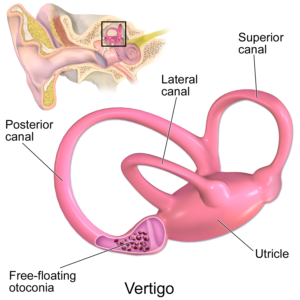How to Treat Vertigo and Dizziness
Vertigo is a feeling of dizziness where you feel that the room is spinning. It is often caused by an inner ear problem because the inner ear has a sensory system that gives you a sense of balance. Less commonly, vertigo can also be caused by brain disorders such as a stroke. Vertigo can make it difficult to work, walk, and carry on with your daily activities. The dizziness can worsen if you move your head or change positions like getting up out of bed. These dizzy spells can last seconds, hours, or days and can happen once in a while or very frequently throughout your day.
I experienced my first episode of vertigo in my late 30’s. When I woke up one morning still lying in bed, I opened my eyes and the room felt as though it was spinning. I tried getting out of bed but even sitting down in my chair was difficult due to the dizziness. The episode I think lasted up to an hour. So I ended up calling sick that day and took a nap. After the nap I felt much better and the day after only had a mild case of vertigo that lasted only a few minutes. I also rose out of bed slowly to give my head some time to adjust when changing positions. Since then, I rarely get vertigo. For me, resting and rising out of bed slowly helped me overcome vertigo.
Key Points
- Vertigo is usually an inner ear problem where you feel like the room is spinning.
- If you have dizzy spells, make sure to sit or lie down in a safe place so that you do not fall and hurt yourself.
- You should contact your doctor if you have vertigo symptoms
- Your doctor may recommend meclizine to treat your vertigo. Meclizine can cause sleepiness so do not take it before driving or going to work.
- To prevent falls, remove your house of clutter and slippery areas and rise out of bed slowly to give your head some time to adjust.
THE CAUSES OF VERTIGO
Vertigo is often caused by inner ear problems. Inside your ear is a sensory system called the vestibular system. The vestibular system is comprised of semicircular canals and special calcium structures (see diagram below). The vestibular system inside your inner ear tells your brain about how your head and body are moving, and it is what keeps you balanced when you are standing or walking.
Here are some causes of vertigo when there is a problem with the vestibular system in your inner ear:
- Benign Proximal Positional Vertigo (BPPV): BPPV is a type of vertigo that happens when you move your head a certain way, which causes calcium crystals inside the vestibular system of your inner ear to move from their normal position. This head movement can cause awful dizziness that lasts up to a minute. BPPV can get better on its own. If it does not, you should see your doctor, where he can perform the Epley maneuver on you. The Epley maneuver moves your head in certain positions to ease your vertigo symptoms. Check the the video below for how to perform the Epley maneuver on your own in a safe manner.
- Meniere’s Disease: This condition happens when there is fluid buildup in your inner ear, and can lead to hearing loss or ringing in usually one ear. Doctors are unsure what causes this type of vertigo, but the vertigo can last from minutes to hours and be accompanied by vomiting. After each vertigo episode, you may still feel off-balance for several days. Fortunately, most people can be treated without surgery.
- Vestibular neuritis or labyrinthitis: This is a type of vertigo that is caused by an inner ear virus infection. You may get nausea and vomiting and have difficulty walking or standing for several days, but gradually most people eventually feel better.
- Vestibular migraine: Sometimes a migraine headache can trigger vertigo symptoms that last a few minutes to several hours.
- Other less common causes: Other less common causes of vertigo include a head injury, certain medications, and conditions that affect the brain such as a stroke or multiple sclerosis.
HOW TO TREAT VERTIGO
In many cases, vertigo will resolve on its own. For more severe cases, your doctor may recommend certain medications or non-medication therapies such as vestibular rehabilitation.
Prevent Falls– If you have difficulty standing or walking because of vertigo, it is important to keep your home clutter free to prevent falls. Remove loose cords that you could trip over. Use an anti-slip mat in the bathtub and wear anti-slip shoes over slippery areas. Also remove any slippery rugs. Keep your home well lit so that you do not walk in the dark and remove any items that you can trip over. Additionally, rise out of bed slowly to give your head some time to adjust to the change of position.
Vestibular Rehabilitation – Your doctor may refer you to a physical therapist who can teach you exercises that help your brain and eyes adjust to different movements of your head, which will prevent vertigo. The sooner you start vestibular rehabilitation after having vertigo, the better your progress will be. Below is a video of a vestibular rehabilitation exercise:
Medications that Treat Vertigo – Medications are only required if you have severe dizziness that lasts several hours or you have dizziness several times throughout the day. For mild dizziness that lasts only for a few minutes, we do not recommend medications. We also do NOT recommend these medications to prevent vertigo.
- Meclizine (Bonine or Dramamine Non-Drowsy): The best over-the-counter medication to treat vertigo is Meclizine (Bonine or Dramamine Non-Drowsy). Meclizine is an antihistamine is often used for motion sickness but it is also effective for vertigo and it has mild side effects such as sleepiness. You should not take meclizine before work or driving because it can make you sleepy. You should stop meclizine after your dizzy spells resolve and only use meclizine for one to two days as needed. You can purchase it here.
- Sedative medications: If meclizine does not work, your doctor may prescribe you a sedative medication such as diazepam (Valium), lorazepam (Ativan), or clonazepam (Klonopin). These medications are called benzodiazepines and require a prescription before taking. You should not take these medications before work or driving because they can make you sleepy. You should stop these medications after your dizzy spells resolve and only use these medications for one to two days as needed.
- Anti-Nausea medications: If you have vomiting due to vertigo, your doctor will prescribe you an anti-nausea medication such as ondansetron (Zofran), metoclopramide (Reglan), or promethazine (Phenergan). These medications are only available with a prescription.
WHEN TO SEE A DOCTOR
You should contact your doctor if you have severe or recurring symptoms as listed below. Your doctor may refer you to a physical therapist who can teach you exercises to prevent or manage your dizziness.
Below are examples of when you should contact your doctor if you have vertigo or dizziness and one or more of the following conditions:
- You get recurrent dizzy spells
- You cannot stop vomiting
- You cannot walk without feeling dizzy
- You have a fever higher than 100.4ºF (38ºC)
- You have trouble seeing, speaking, or hearing
- Your face droops to one side, or you have weakness in an arm or leg
- You have chest pain
- You are older than 60
- You had a stroke in the past
- You are at risk for having a stroke (risks include diabetes, smoking, etc)


